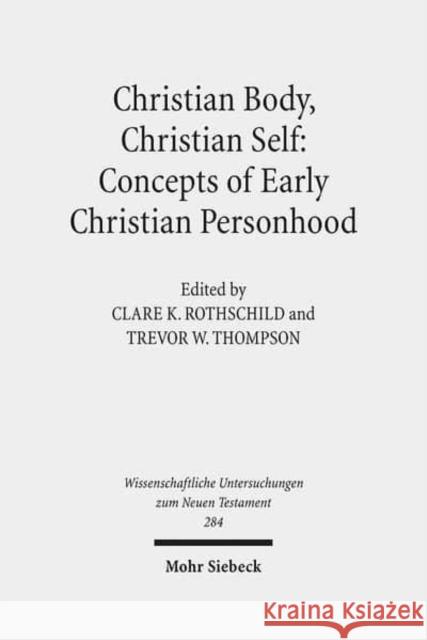Christian Body, Christian Self: Concepts of Early Christian Personhood » książka
Christian Body, Christian Self: Concepts of Early Christian Personhood
ISBN-13: 9783161509506 / Angielski / Twarda / 2011 / 370 str.
Early Christian texts are replete with the language of body and self. Clearly, such concepts were important to their authors and audiences. Yet usage rarely makes sense across texts. Despite attempts to establish a single biblical or Christian vision of either body or self across texts, the evidence demonstrates plurality of opinion; and, reception history multiplies interpretations. Depending upon the particular anthropological-philosophical paradigm of the interpreter (e.g., Platonic, Cartesian), Christian texts reflect a number of views about the body and self. Today, scholarship on these concepts advances in many different directions. In addition to sophisticated new methods of drawing history-of-religions comparisons, scholars place early Christian texts in conversation with philosophy, psychology, political science, and developments in the hard sciences--in particular the neurosciences, sometimes all but doing away with the notion of self. Recent studies and monographs focus on the disabled body, the gendered body, the slave body, the martyr's body, relevance of ancient scientific and medical treatises for understanding the body, the asexual body/self, embodied knowledge, the suffering self, and religion and the self. The essays in this volume individually and collectively participate in these ongoing discussions. They do not proceed with a uniform notion of either self or body, but recognize competition on the topics, ably captured by the variety of approaches to their meaning in antiquity and today, and offer nuanced analyses of texts and passages, highlighting individual perceptions of these crucial yet enigmatic concepts.
Early Christian texts are replete with the language of body and self. Yet usage rarely makes sense across texts. Scholarship on this vitally important issue advances today in a number of different directions. In addition to sophisticated new comparative strategies for interpreting representations of body and self vis-à-vis ancient religious, philosophical, anthropological, rhetorical, medical, and other literatures, scholars also place the texts in conversation with modern philosophy, psychology, political science, and developments in the hard sciences, in particular the neurosciences. The essays in this volume individually and collectively participate in these ongoing discussions, offering nuanced analyses that highlight the individuality of perceptions of these crucial yet enigmatic concepts.§Contributors: §Robert Matthew Calhoun, Troels Engberg-Pedersen, Matthew Goff, Fritz Graf, Karina Martin Hogan, Annette Bourland Huizenga, David Konstan, Stefan Krauter, Manfred Lang, John R. Levison, Alec J. Lucas, Troy W. Martin, Martin Meiser, Richard I. Pervo, Clare K. Rothschild, Janet E. Spittler, Romulus D. Stefanut, Trevor W. Thompson











